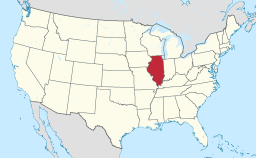Western Springs, Illinois
| Western Springs, Illinois | |
| Village | |
|
Historic water tower
|
|
| Motto: A Village of Towering Character | |
| Country | United States |
|---|---|
| State | Illinois |
| County | Cook |
| Township | Lyons Township |
| Coordinates | 41°48′20″N 87°54′04″W / 41.80556°N 87.90111°WCoordinates: 41°48′20″N 87°54′04″W / 41.80556°N 87.90111°W |
| Area | 2.79 sq mi (7 km2) |
| - land | 2.79 sq mi (7 km2) |
| - water | 0.00 sq mi (0 km2) |
| Population | 12,975 (2010) |
| Density | 4,650.5/sq mi (1,796/km2) |
| Founded | 1886 |
| Village President | William Rodeghier |
| Timezone | CST (UTC-6) |
| - summer (DST) | CDT (UTC-5) |
| Postal code | 60558 |
| Area code | 708 |
|
Location in Cook County and the state of Illinois.
|
|
|
Location of Illinois in the United States
|
|
|
Website: www |
|
Western Springs is a village located in Cook County, Illinois, United States and is a suburb of Chicago. As of the 2010 census, the village had a total population of 12,975. It is twinned with Rugeley, United Kingdom.
In November, 2007, BusinessWeek.com listed Western Springs second in a list of the 50 best places to raise children. The rankings were based on five factors, including school test scores, cost of living, recreational and cultural activities, number of schools and risk of crime. Western Springs ranked behind Groesbeck, Ohio.
Western Springs, an affluent suburb located along the Chicago, Burlington & Quincy Railroad (now the Burlington Northern Santa Fe) between Chicago and Aurora, encompasses roughly the area between Willow Springs Road (Gilbert Avenue), Ogden Avenue, Interstate 294, and West Plainfield Road. Named for local mineral springs on the southwest side of town, Western Springs originally consisted of flat prairie land with a swamp on its western border.
Around the turn of the 18th century, nomadic Potawatomi Native Americans settled in the Western Springs area. It is unclear whether they built a village, but evidence of temporary campsites has been found near Flagg Creek in Forest Hills. The natives were gone by the end of 1835, but Potawatomi artifacts may still be found buried in the Springdale neighborhood. The last Cook County campground of the Potawatomi was within what is now the Timber Trails subdivision.
The first known settler in the area near Western Springs was Elijah Wentworth. By 1834, after the Black Hawk War, farmer Joseph Vial had moved from New York and built a cabin along what is now Plainfield Road, an ex-Native American trail in the south of Western Springs. This cabin served as a stagecoach station, hotel, general store, and post office for the entire area.
...
Wikipedia



